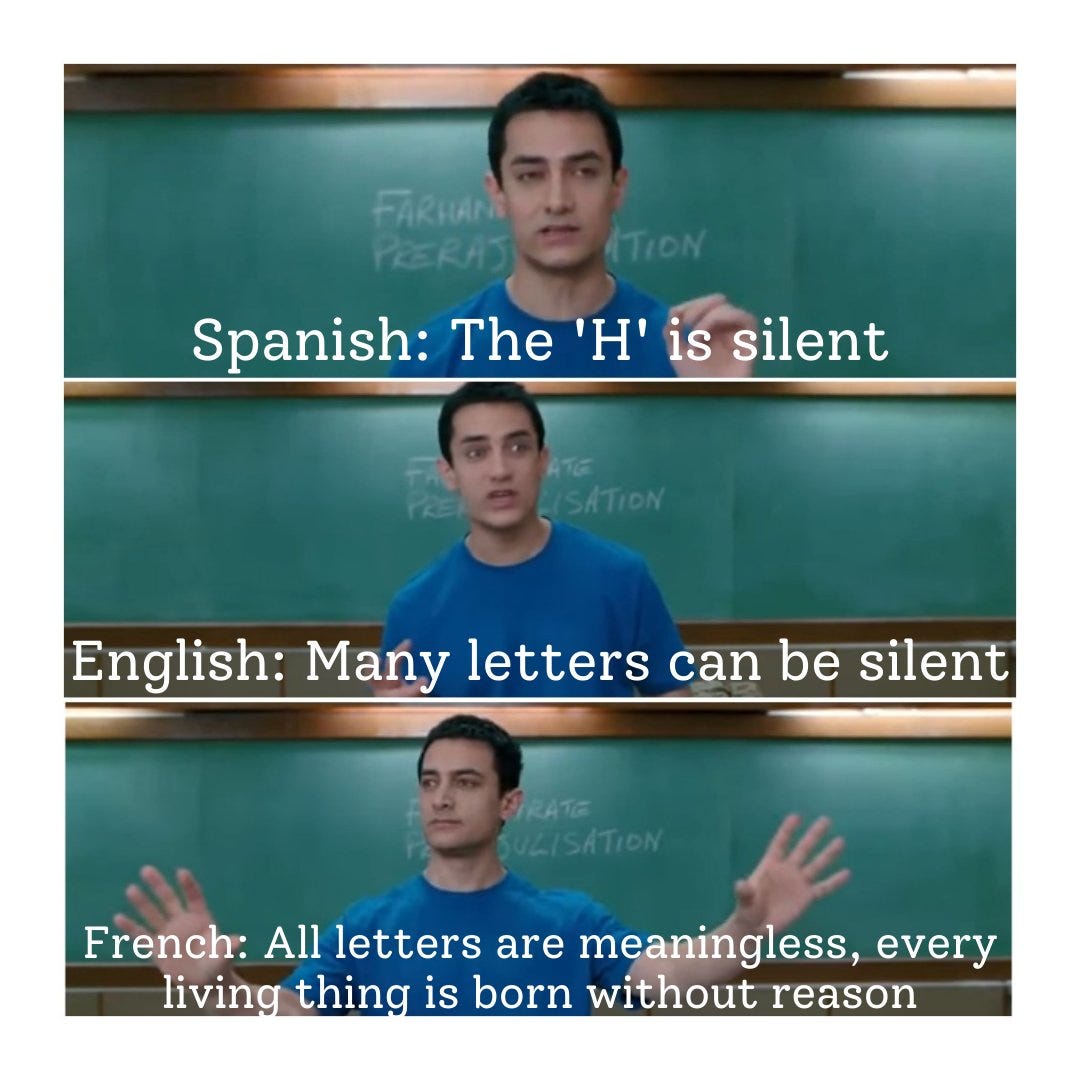You're over thinking it
Some ways you might be holding yourself back
Welcome, aspiring polyglot! During one on one private lessons, the thing I say the most is probably, “you are over thinking it” and it is something worth diving into for all language learners. It can be easy to make things more complex than they are and second guessing is seemingly an inherent trait in all learners. Your goal, over time, should be to completely do away with these things. Sometimes, as hard as it may be to believe at first, you do actually know what you are talking about and you should act as such. Second guessing yourself is rarely valuable. You must learn to trust your instincts.
Some words are just what they seem
While it is important to be aware of false friends and the danger they can bring to your language acquisition, that does not mean you should discount the utility of words that look the same or similar. Native English speakers are in a good place because English has a habit of pulling words from languages around the world to call our own. Barring some extremes, all you really have to do is learn the alphabet.
Knowing the roots of the words can be helpful, but you would be amazed at how often simply pronouncing the word with an “x language” accent will work. When I was learning French, my bread and butter was pronouncing English words with a French accent. It worked far more often than I expected to while allowing me to practice pronouncing things the way a native French speaker would. This, in turn, helped me understand why French speakers have the accent that they do, which made future speech on my end even easier.
Learning the alphabet and knowing it well is absolutely crucial for this to work. If you don’t know how things are supposed to be pronounced then it will be difficult for you to try and pronounce things the same way native French speakers do. Spending two or even three weeks truly mastering the alphabet and the phonics will set you up for long term success with your target language. It is a step that no adult enjoys, but skipping it will cause some major problems later down the line.
False friends can also be a problem. The verb “quitar” in Spanish does not mean quit, nor does the verb “quiter” in French mean quit. They both, however, mean “to remove” which is good to know when learning multiple Romance languages. In simple terms, false friends are words that look like they will mean the same thing, but don’t and therefore tend to lead to miscommunications. Your challenge is going to be learning to balance your gut feeling of a word’s meaning and the risk of running into a false friend.
The best way to speak fluidly
When it comes to practicing your speech, there are a few things you can do without the risk of looking stupid. Everyone is afraid of making mistakes in front of others, but you can practice speaking fluidly on your own. If you are willing to do it, then you can record yourself and critique yourself. Most people, my self included, will not be willing to do this. For us, there is the ability to read out loud.
Trying to understand what you are reading is important, but during this exercise we are going to throw that idea out entirely. All you are going to focus on when practicing this is reading the words as fluidly as possible. Start with one or two sentences then go on to three then four and so on. Your goal is to avoid stopping. Read with the punctuation, but do not stop, hesitate, repeat, or stutter. At first you are certainly going to be making these mistakes, but over time it will get better.
This is another instance where understanding the alphabet and the phonics of your target language is vital. Once you are able to read it out loud fluidly, you can focus on trying to understand the meaning. Until then, just keep reading and speaking and training your mouth to make new movements. There are sounds and letters in every language that do not exist in English. If you have never made a specific sound, it is necessarily going to take time to train your mouth to do that weird motion.
Take this step by step and stop when you get frustrated. It shouldn’t be embarrassing, but it will be frustrating. Doing this exercise when I first started learning French is probably the reason I am able to sound like a native speaker still ten years later. Truly focus on the reading and pronunciation alone and you will quickly understand why this is a good exercise for you.
The next step is adding in the interpretation. You should continue reading aloud throughout the duration of your language acquisition, parents have an advantage here. Only, until you can read pages at a time without interruption, you should stick to reading the words, not trying to understand them. Nothing beats going back to a book that you read without understanding a word only to realize that everything makes sense now and you can read it without issue, silently or aloud.
You can be wrong
After you have practiced reading someone else’s words and speaking them aloud, it is time to create with your own words. That is where being wrong is so important. So long as you can get your point across, little else matters. Of course, you want to get to the point where you aren’t just getting your point across, but that is where it is going to start. In order to get better you have to know where you need to work.
Writing will make it clear exactly what you need to practice. Once something is written down, particularly in pen, you have to face what you did. That will help you focus your energy on the things that move the needle the most. Not only that, but when you can physically see the mistakes you are making, correcting them is a lot easier than if you are just trying to remember the things you’ve messed up while speaking.
During the time when you are writing, you should be using your brain only. There is no reason to be using translation help at this point because perfection is not the goal. If you don’t make mistakes you won’t make corrections. But worse, you won’t have a written record of all the progress you have been making. Start writing early and often and you will see in real time how you learn to think in this new language.
Conclusion
As cliché as it sounds, most of the time you are probably getting in your own way. You will always be your own harshest critic, so your challenge is to learn to be comfortable making mistakes in front of yourself. This is the biggest hurdle, but it is also the easiest one to get over. Since the only risk is sounding less than perfect in front of yourself, your entire focus can be on getting out of your own way. Eventually you will be able to transfer this skill to your work with native speakers.
The more you speak the better you will speak, so start as early and speak as often as you can. Reading out loud, for as long as possible, and always increasing the amount is the perfect training. Combined with writing this strategy can and will enhance and accelerate your second language acquisition. It will be difficult, but you can do difficult things and become great. So go do some difficult things and become great.
Requests
If you have anything you would like covered you can reach out to me on X, Instagram, or at odin@secondlanguagestrategies.com.
Additional Resources
Don't want to spend time playing catch up? Pick up the 3 Months to Conversational book now available on Amazon! 3 Months to Conversational
For more long form content be sure to check out the website!
Subscribe for new content on YouTube and TikTok!
Learning Spanish? We have begun aggregating resources in you Spanish Resource Newsletter!
Don't forget to pick up your very own French Language Logbook or Spanish Language Logbook!






